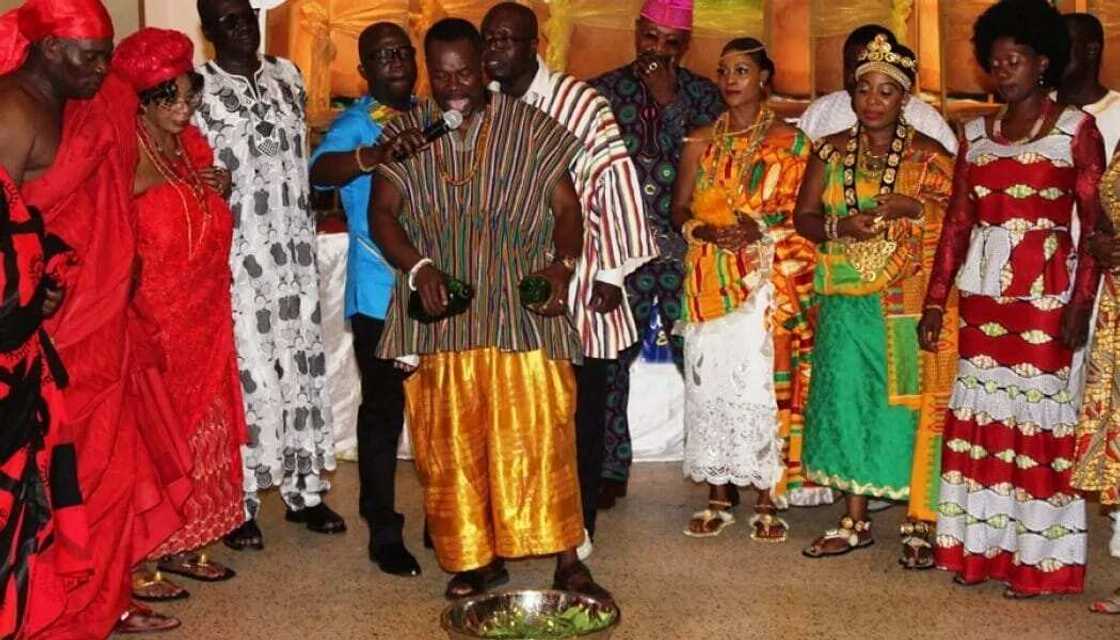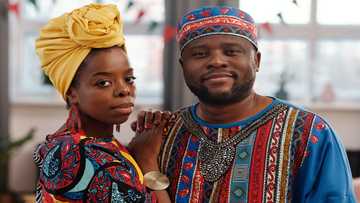Ghanaian engagement list for Ga-Adangbe
Marriage amongst the Ga-Adangbe people cannot start without the collection of the Ghanaian engagement list. As the joining of a man to his wife is a major decision in Africa, it is held with much respect and honour. Some people even regard it as sacred. After a man is sure of his decision to marry the woman of his dreams, he goes a step further to meet her family as a sign of seriousness. The family, after accepting him, shows their allegiance to the union by requesting to meet with his family, and then the process starts. Even though Africans seem to share certain similarities, however, cultural practices and customs differ from one setting to another. Therefore, in this article, we take a look at the engagement process involved among the Ga-Adangbe people.

Source: Depositphotos
The Ga-Adangbe people of Ghana hold the marriage process dear as they see it as the fulfillment of their cultural and religious practices. Among other requirements that a man must meet is the provision of the items on the engagement list given to him. This Ghanaian engagement list contains peculiar items that indicate the seriousness of the ceremony. So, if you planning a beautiful marriage ceremony and you need the list of things to consider for engagement for Ga-Adangbe, then this article is for you.
READ ALSO: Full printable wedding checklist for couples in Ghana
In Ghana, irrespective of the tribe, there are three main types of marriage that exist. These are the customary or traditional marriage, the marriage under the ordinance and the Islamic marriage.
1. Customary marriage
The customary marriage in Ghana remains the oldest form of marriage before western influx. It is usually conducted by the nuclear and extended families of both the bride and the groom. This type of marriage showcases the culture and custom of each tribe and it differs from one tribe to the other. What makes it unique are the payment of bride price or dowry, giving of gifts to relatives and handing over of the bride to the groom by the bride's parents. However, customary marriages are not legally binding except such is registered with the Ghanaian government under the Customary Marriage and Divorce Registration Law of 1985 (PNDCL 112).
2. Marriage under the ordinance
This kind of marriage talks about the joining of a man to his wife under the Christian religion. Although, there are those who believe that it really has nothing to do with Christianity. It is also regarded as a white wedding or church wedding. This type of marriage came into existence with the advent of Christianity and westernization. The entire wedding process is often held in the church except otherwise, ministers are invited to officiate in the marriage ceremony.
3. Islamic marriage
This has to do with marriages that are conducted under the Islamic religion. The joining is conducted by the Islamic cleric. Some of the processes involved are giving the cleric a week advance notice and after the whole process, registering the marriage under the ordinance to validate it.
List for Ghanaian engagement
This is the general list that is given to the groom and his family in every Ghanaian tribe. It consists of the basic items that must be provided in every Ghanaian traditional marriage. Here is a sample of Ghanaian engagement list; it is expected to contain the following:
1. The bride price
This represents the payment made to the parents of the bride before the man can lay claim to her. It can either be monetary or in kind. It must be given before the couple is joined. Usually, it is viewed as an appreciation or as compensation to the parents of the bride for their efforts on her over the years.
2. The traditional drink
This is usually a dry gin that goes by the name Schnapp. It is given to show respect and it must be delivered before speaking to or with an elderly person in the bride's house. It is for the knocking ceremony in Ghana and it is the first step in the ceremony. Also, the Yitso Daa is a bottle of drink, usually whiskey or gin. It is given together with some amount of money to the bride to set up a business or to support an existing trade. The essence of this is to encourage an entrepreneurial spirit in the bride. Soft drinks are also provided for the bride, although this comes last.

Source: Depositphotos
3. A suitcase
There is a suitcase traditionally called Yooshi Bimor which is specially given to the bride. It is expected to be filled with beautiful fabrics, the engagement ring, the Bible and a hymn book. Then, the other items that are expected to be given along with the suitcase are the Bue (a piece of red cloth used as sanitary towels); a coal pot; fufu mortar and pestle; and sewing machines. Then, some money called Shika ni tele jatsu is given alongside the suitcase for the bride to sew or buy her white wedding dress with.
READ ALSO: Photo of a man excited over his father’s death pops up on the internet
4. Provision of pacification for the in-laws
The list must consist of the provision of pacification for the in-laws. The father of the bride shall be given a monetary gift called Ahenema and full piece of fabric as appreciation and pacification for his fatherly role to the bride from childhood to adulthood. Then, a half piece of fabric plus headgear and some money are also given to the mother of the bride to praise her for her effort for raising a beautiful and honourable woman.
More so, the bride’s brothers are also compensated with a monetary gift to appreciate their effort in protecting the bride and ensuring no other man laid claim to her.
5. Thanksgiving gift for the bride’s family
The list is completed with a Thanksgiving gift for the bride’s family. This can either be a monetary gift or a crate of alcoholic drink.
Ga-Adangbe traditional marriage in Ghana
The wedding day is the most exciting day to the bride and groom. It is difficult to know the most excited, whether parents, the couple or the entire family. The day is usually colourful and joyous. The Ga-Adangbe traditional marriage is no different. The day starts with the bride gaily dressed by her closest friends and kept inside until she is called. She wears the kente cloth which is the traditional Ghana fabric embellished with beads.
On the other hand, the groom’s family arrives but are denied entry until the knocking ceremony is fully conducted. They present their gifts which are the provision of the items on the engagement list. The traditional marriage ceremony is conducted by both the bride and the groom’s family.
After the handing over ceremony which is the giving of the bride to the groom, then, there is a celebration and dancing accompanied by food. Food often served at the marriage ceremony are Eto and Jollof. After all had been done, the groom leaves with his bride.
READ ALSO: Cute love images for her
Ga-Adangbe marriage list
The Ga-Adangbe are a people rich in culture. They are one of the Ghana tribes that has upheld their ancient traditions and customs despite the influence of the westerners on Greater Accra region where they are located. Therefore, their engagement list is a bit bulkier. Below is the list. The engagement ceremony list is divided into three parts.

Source: Depositphotos
The first part on the list is items needed for the knocking ceremony called Agboshimo. The following must be provided for this part:
- A fee regarded as Shiwo is given to notify the bride’s parents of the man’s intention to marry their daughter.
- It must be presented with a bottle of wine.
- Then, the Kplemo, that is, the acceptance fee is given by the groom to be as an indication of him receiving the engagement list.
The second aspect on the list is the Yoo Tuumo which contains the needs for the actual engagement. The content on this part of the list is majorly for the bride to be. It will include the following:
- The engagement ring otherwise known as Ga;
- The bible and hymn book;
- 2 bottles each of wine, whiskey and gin. Then, 2 cartons of beer, 2 castle bridge, and 6 bottles of soda drink;
- Shika which is the monetary gift given to the bride for her wedding dress, accessories, makeup and hair;
- Tuumo dan and Too shibimo are also cash gifts for the bride to set up a business or support an existing career.
The third part of the Ga-Adangbe marriage list is the dowry, that is the bride price. Traditionally, it is referred to as the Nihamo. It is a cash gift given to the parents of the bride and other relatives. It is supported with other gift items for the bride. These are:
- Six half pieces of textiles with matching headgears and jewellery;
- Twelve pieces of full lappa;
- The traditional Kente fabric;
- Set of neck, waist and wrist beads;
- Two wristwatches;
- Two pairs of shoes and bags;
- Undies which shall include the Bue amongst others;
- Cosmetics.
All of the above-mentioned are usually packed into a suitcase. Apart from those, there are also:
- Gift for the bride’s father regarded as Shaanuu. This is often men’s cloths and cash gift;
- Gift for the bride’s mother regarded as Shaayoo which is a half piece of cloth and cash gift;
- Gift for the brothers-in-law regarded as Dhabi which is often cash gift;
- The gift for the extended relatives who serve as witnesses is cash or crates of wine. This is given as an appreciation for their support.
Having said all these about the Ghanaian engagement list and the Ga-Adangbe tribe, it is usually advisable that the bride-to-be works with a wedding checklist. This is because wedding planning process can get overwhelming. Based on this, there is the possibility that a groom may forget things. However, when he is armed with a checklist, it couple the groom to track their wedding plans and measure the progression of things.
READ ALSO: Love poems for him from the heart
Source: YEN.com.gh









